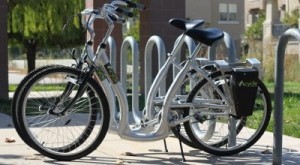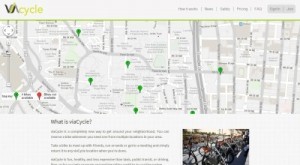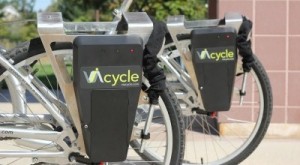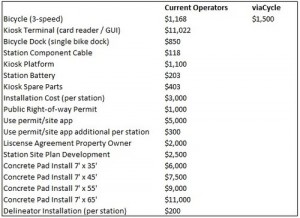ViaCycle (Outsource B)

Basic Information:
Viacycle combines new ideas in transportation with cutting edge IT to give users the opportunity to travel where and when they want. The company stresses that each system is tailor-made to best fit the client’s needs, and that the bikes are easy to deploy, manage, and use. Viacycle has implemented three bike-share systems thus far: Georgia Tech, George Mason, and Las Vegas.
Technical Analysis (How it Works):
Viacycle sets up networks of bicycles around the campus using pre-existing bike racks, meaning that no kiosk-type system is needed – only the bikes and the Viacycle technology system. Users can go online or use a mobile app to see the locations and check the availability of bikes in their area. Because bikes will be located at central hubs on campus, users will always know where to find an available bike. To check out a bike, users can simply use the mobile app or text/call Viacycle.

Figure 2: A web display showing locations and availability of Viacycle’s bikes.
Another impressive feature of Viacycle is that the user has the ability to leave it parked anywhere, as long as it is returned to the bike rack / docking station at the end of the trip. This is made possible because the bikes have a locking mechanism built in, allowing safe and secure storage no matter the location. Only the user will have access to the bike once parked, therefore preventing theft as well. This feature is particularly useful in the event that the user needs to run a quick errand while riding a bike, such as shopping for groceries or visiting a friend around campus.
The bicycles also have a lighting feature to display availability. A green light means the bike is available for use, while a red light means the bike is checked out. Yellow means the bike is still checked out but is not currently in use, as described above. The bike will be locked, awaiting your return.

Economic Analysis

As seen in the chart above, each Viacycle bike will be one flat cost of approximately $1,500. Note that there are no other expenses, as opposed to the complex cost structure of current operators – this is because of Viacycle’s “tech-on-bike” system and use of normal, pre-existing bike racks as opposed to a custom-designed kiosk. For 10 bike on Lafayette’s campus, the total cost of the bikes is $15,000. There will also be additional costs for mobilization, labor, and maintenance thereafter.
___________________________________________________________________
To navigate accross the page please use the following links:
• Bike-share Meets Lafayette
• The Team
• Defining the Scope
• Challenges and Mitigating Factors
• Solutions
• Conclusion
• Bibliography
